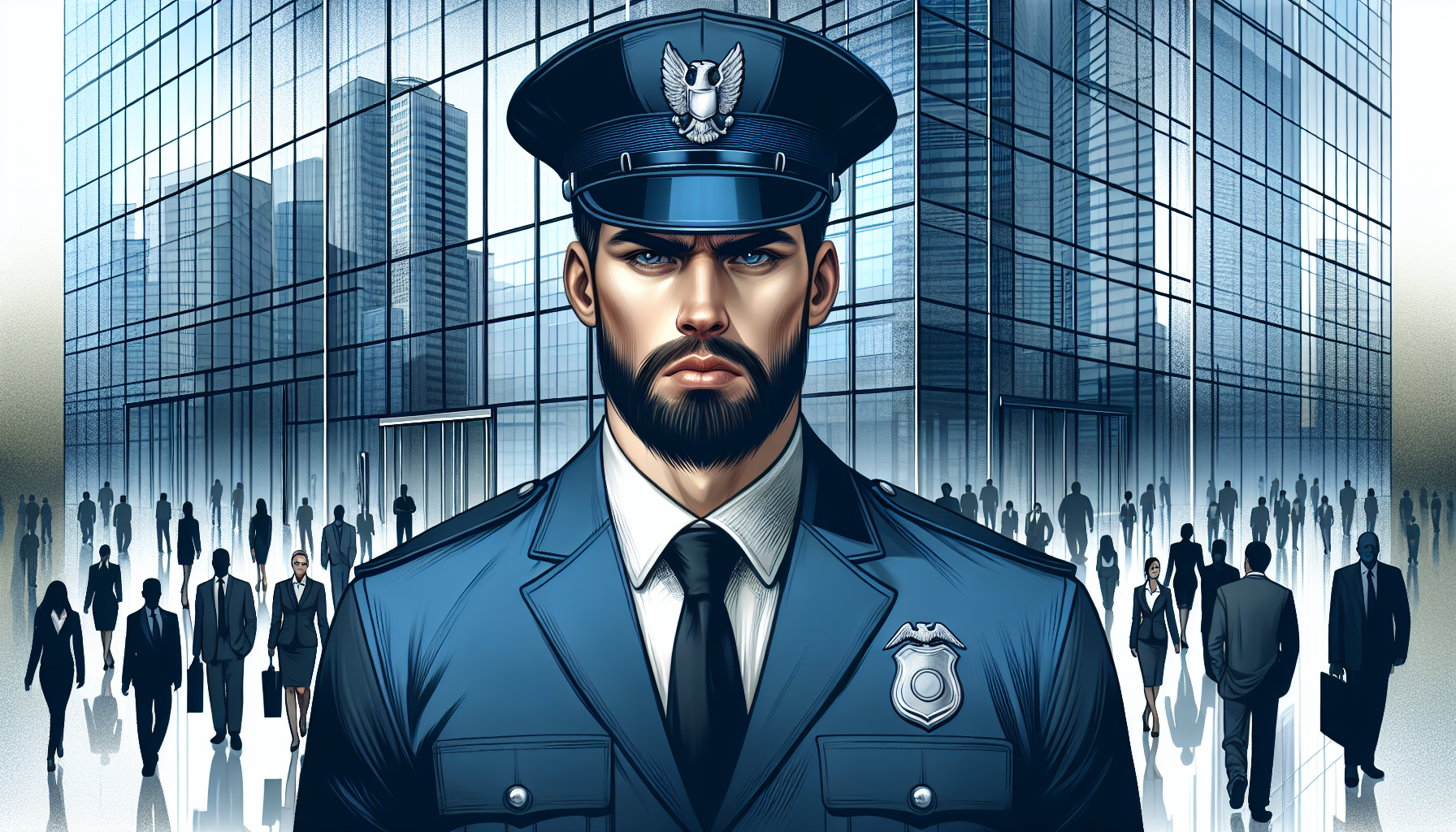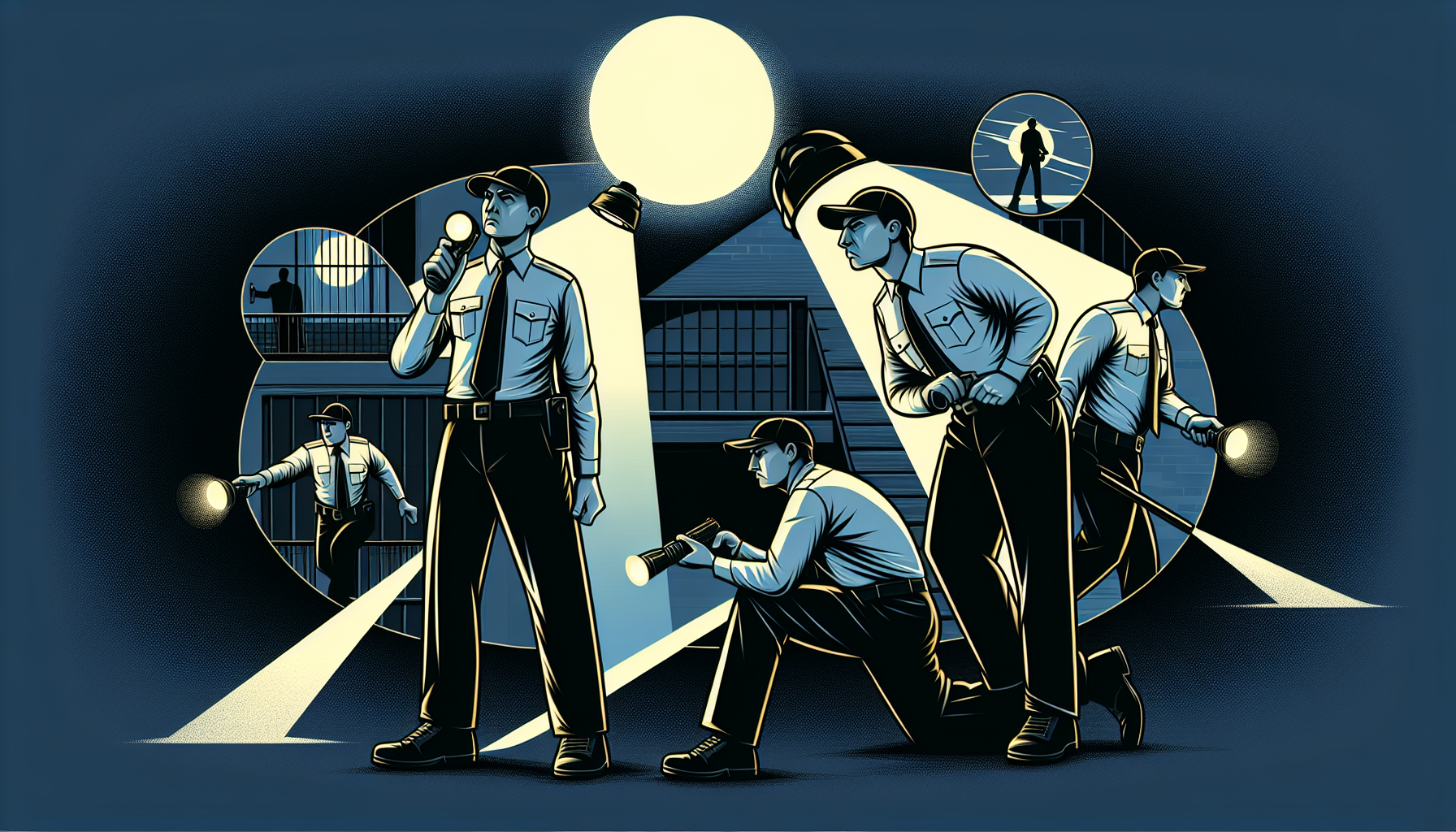Are you mulling over the idea of being a security guard? The decision isn’t simple—there’s a mix of stability and risk, opportunity, and challenge. In our no-nonsense guide, we dissect the pros and cons of being a security guard. Job stability, diverse environments, and personal growth await on one side, while potential danger and modest pay loom on the other. We’ll help you navigate this landscape, so you can determine if this path aligns with your career goals and lifestyle.
Key Takeaways
- The security guard profession is characterized by job stability and demand across multiple industries, promising long-term prospects and a variety of work environments.
- Security guards must develop crucial skills such as conflict resolution, first aid, CPR, and emergency response, with continuous training and legal knowledge being indispensable for their roles.
- Despite the benefits, the profession involves challenges including potentially dangerous situations, tasks that can be monotonous, irregular hours, and the impact on personal life and well-being.
Job Stability and Demand

The security profession, particularly the security industry, is compelling due to its key factors of job stability and demand. The field has shown consistent growth since 2004, with an annual rate of 0.78%. The security guard field is projected to create 85,560 new jobs by 2029.
Despite a slight projected decrease of 1.3% in employment between 2022 and 2032, the overall job market for security guards remains stable. The demand for security guard positions spans multiple industries, including:
- Retail
- Corporate
- Healthcare
- Education
- Hospitality
- Government
Growing industries
The demand for security guards spans across a variety of industries. In recent years, states like the District of Columbia, New Jersey, and Michigan have experienced the highest job vacancies and growth rates for security guards. In 2021, 60% of the security workforce in the U.S. was engaged in investigation, guard, and armored car services.
This diversity offers an array of experiences, making the job interesting and providing multiple pathways for skill development and career advancement.
Job availability
Job stability can be measured by job availability. In the United States, over one million jobs were held by security guards in 2021. The demand varies regionally, with California, New Jersey, and Michigan leading in employment numbers.
The broad range of security guard roles, coupled with a variety of work environments, indicates numerous unfilled positions for those willing to accept the challenge.
Long-term prospects
The profession promises promising long-term prospects. Job creation in the sector is projected to grow annually. For those seeking advancement, there are opportunities to rise into managerial roles or specialized areas like cybersecurity.
The job stability, combined with these long-term prospects, make a career as a security guard not only viable but also potentially rewarding.
Diverse Work Environments
One of the advantages of being a security guard is the chance to work in diverse environments, from corporate offices to retail stores and events. This variety adds an element of unpredictability and excitement to the job, making it more interesting. Each setting comes with its unique set of challenges and rewards, contributing to the dynamic nature of the profession.
Corporate settings
Security guards working in corporate settings are vital, as they:
- Safeguard business properties
- Prevent illegal activities
- Protect office buildings and corporate headquarters along with their premises, personnel, and assets
This role demands vigilance, attention to detail, and a strong commitment to the corporate environment. The nature of the job varies, with the responsibility of protecting a wide range of assets, from banks to art galleries, and ensuring the safety of both employees and guests.
Retail and commercial spaces
In retail and commercial spaces, security guards primarily focus on preventing theft and vandalism while ensuring the safety of patrons and employees. This role involves a different set of skills and experiences, contributing to the diversity of the profession.
Events and concerts
Security guards face unique challenges while working at events and concerts. The management of large groups of people in high-risk environments, potential altercations, or mass panic situations demands strong interpersonal skills and quick thinking. Security guards at these venues need to be quick and decisive to prevent escalation and protect the well-being of participants.
The long hours and constant alertness make working at events physically and mentally demanding.
Skill Development and Advancement
The role of a security guard extends beyond maintaining order to include the development of valuable skills. Security guards are trained in a range of skills, from protecting individuals and property, enforcing rules, to responding in emergency situations. These skills, learned on the job, serve as a foundation for career advancement opportunities in the security sector or related government fields.
Conflict resolution
Security guards find conflict resolution to be a key skill. It allows them to mediate disputes effectively, maintain composure under pressure, and de-escalate potential violence. The ability to resolve conflicts contributes to a secure environment by preventing theft and vandalism. Security guards employ communicative strategies like active listening, empathy, and effective nonverbal cues to defuse tensions during conflicts.
These techniques involve discussing choices and consequences, remaining neutral, and seeking common ground to encourage collaborative solutions.
First aid and CPR certification
Another set of valuable skills for security guards is first aid and CPR certification. This knowledge gives guards the confidence to act decisively and effectively in high-pressure situations. In emergency situations, security guards are trained to provide critical medical assistance until professional help can be obtained.
This enhances their professional credibility and marketability, as clients highly value the safety of their stakeholders.
Emergency response training
Security guards are prepared to handle crisis situations and protect people and property through emergency response training. Training for security guards covers critical skills, including:
- Legal powers and limitations
- Established emergency procedures
- Detainment of criminals
- Use of non-lethal security devices
Night shift security guards receive specialized on-the-job training to prepare them for handling crisis situations more prevalent during night hours.
Flexible Hours and Shift Work

The flexible hours and shift work are among the appealing aspects of being a time security guard. Full-time, part-time, and shift work options are available, accommodating personal schedules and commitments outside of work.
This flexibility can particularly benefit security guards who are pursuing further education by allowing them to attend classes.
Part-time opportunities
The diversity of many security positions offers part-time roles like:
- screeners
- guards
- surveillance officers
- patrol officers
- security escorts
The steady demand for security professionals across various fields ensures the availability of part-time opportunities. This flexibility allows security guards to balance work with other life pursuits, such as education or personal interests.
Night shifts
While night shifts can offer higher wages and thrilling work experiences, they may disrupt the work-life balance. Working night shifts in high-security environments can provide an exciting and demanding work experience. However, irregular shifts, including night and weekend work, can upset a security guard’s sleep patterns and work-life balance, possibly causing feelings of isolation and increased stress.
Rotating schedules
Rotating schedules offer variety but can be demanding, requiring endurance and vigilance from security guards. Security guards who work through breaks, including meal and rest breaks where they stay on-site or monitor devices, receive additional hourly compensation due to the impact on their personal time.
However, they are expected to have the endurance to remain alert and vigilant throughout extended or unpredictable shifts that come with rotating schedules.
Potentially Dangerous Situations
Being a security guard entails facing potentially hazardous situations. The primary risk is confronting threats and criminals who may target guards during their duties. This high-stress environment can lead to significant mental stress due to the necessity to remain alert and the threat of potential confrontations.
Confronting criminals
The risky task of confronting criminals requires quick thinking and strict adherence to legal limitations. Security guards are at a heightened risk of physical harm when confronting aggressive or armed individuals. They must be able to think quickly and adapt their responses immediately.
Continuous training is essential to stay current with sophisticated and evolving criminal methods.
Deescalating conflicts
Security guards need the crucial skill of deescalating conflicts to maintain safety and prevent violence. Security guards are trained in conflict resolution techniques to defuse volatile situations and minimize the risk of violence. Their role in retail and commercial spaces includes:
- deterring criminal activities
- controlling access
- responding to emergencies
- providing customer service while ensuring safety.
Personal safety concerns
Personal safety concerns are also a reality for security guards. They may encounter various physical dangers, such as:
- slips, trips, falls
- vehicular accidents
- fire
- electrical hazards
- violence potentially involving weapons
The demanding nature of their work can expose them to health risks, including physical risks, leading to physical and psychological stress.
Monotonous Tasks and Limited Social Interaction
Being a security guard involves not only adrenaline-pumping action but also monotonous tasks and limited social interaction. Some of the tasks that security guards often perform include:
- Routine patrols
- Monitoring surveillance cameras
- Checking identification
- Conducting security checks
- Responding to alarms
- Writing reports
While these tasks can be repetitive and lead to feelings of monotony and boredom, they are essential for maintaining safety and security.
Due to long hours of inactivity and isolation during shifts, security guards may experience limited social interaction, leading to feelings of isolation.
Routine patrols
The routine patrols of a security guard can be tailored to match individual activity level preferences. While these patrols can become repetitive, they offer solitude for those who prefer to work alone.
Monitoring surveillance cameras
The task of monitoring surveillance cameras can also become monotonous, potentially causing disengagement and decreased vigilance. Despite this, security guards play a crucial role in maintaining vigilance through the monitoring of surveillance camera footage to detect suspicious behavior and enhance security measures.
Isolation during shifts
Isolation during shifts can lead to feelings of loneliness and negatively impact mental well-being. Security guards often work alone, particularly during night shifts or in remote surveillance areas. This solitude, especially at odd hours or in less trafficked settings, can induce feelings of isolation among security guards.
Impact on personal life
The demanding nature of security work can lead to burnout and challenges in maintaining quality time with family. Being a security guard is physically, emotionally, and mentally demanding. Often, guards face challenges in maintaining quality time with family, leading to negative consequences such as missing workdays and potentially exiting the profession.
Continuous Training and Legal Responsibilities
For security guards, continuous training and comprehension of legal responsibilities are indispensable. Ongoing training is crucial for security guards to maintain their licenses and stay up-to-date with current practices. In New York State, unarmed security guards are required to undergo extensive pre-assignment and on-the-job training to meet the necessary qualifications. This training includes completing numerous hours of education and practical experience. Armed security officers have even more rigorous requirements.
Legal knowledge
To understand their powers and limitations, security guards require crucial legal knowledge. Training requirements can vary significantly depending on the job and state regulations. They receive extensive training in emergency response, including how to address fires, medical emergencies, natural disasters, and acts of violence.
Security guards face legal consequences, such as civil lawsuits and criminal charges, if they exceed their legal authority.
Physical fitness requirements
Another critical requirement for security guards is physical fitness. They are expected to be in good physical condition to fulfill the demands of their role. Good vision and hearing are necessary for security guards to effectively monitor and assess potential threats in their environment.
Agility and flexibility are important attributes for security guards who need to act swiftly in emergencies or maneuver within tight spaces.
License renewal and certifications
Maintaining professional credibility and preparedness requires license renewal and certifications in areas like CPR and weapons handling. In order for security guards to effectively respond to emergency situations, maintaining CPR certification is essential.
Proper training in weapons handling is crucial for security guards who are armed, to ensure safety and preparedness.
Summary
In conclusion, being a security guard is a profession of balance – balancing vigilance and risk, training and on-the-job experiences, job stability and demands, and the pros and cons of diverse work environments. It’s a career that offers job stability, diverse work environments, skill development, and the chance to make a difference in people’s lives. However, it also comes with challenges like potentially dangerous situations, monotonous tasks, limited social interaction, and irregular hours. Despite these challenges, many find the rewards well worth the risks.
Frequently Asked Questions
How stressful is being a security guard?
Generally, being a security guard is very boring. You are often alone. However, there can be times that being a security guard can be very stressful due to the potential for injury.
What is the advantage of being a security guard?
Being a security guard offers the advantage of making a positive impact on people’s lives and maintaining a safe environment, while also providing job security, stability, and opportunities for personal and professional growth.
What are the prospects for job growth in the security industry?
The security industry shows promising prospects for job growth, with an annual positive trend and opportunities for advancement into specialized areas like cybersecurity.
What skills do security guards develop?
Security guards develop skills in conflict resolution, first aid, CPR, and emergency response, which are crucial for maintaining safety and handling diverse job-related situations.
What are some of the risks associated with being a security guard?
Being a security guard carries the risk of facing dangerous situations, including confronting threats and criminals targeting them. Additionally, security guards face personal safety concerns due to the physical and demanding nature of their work.

